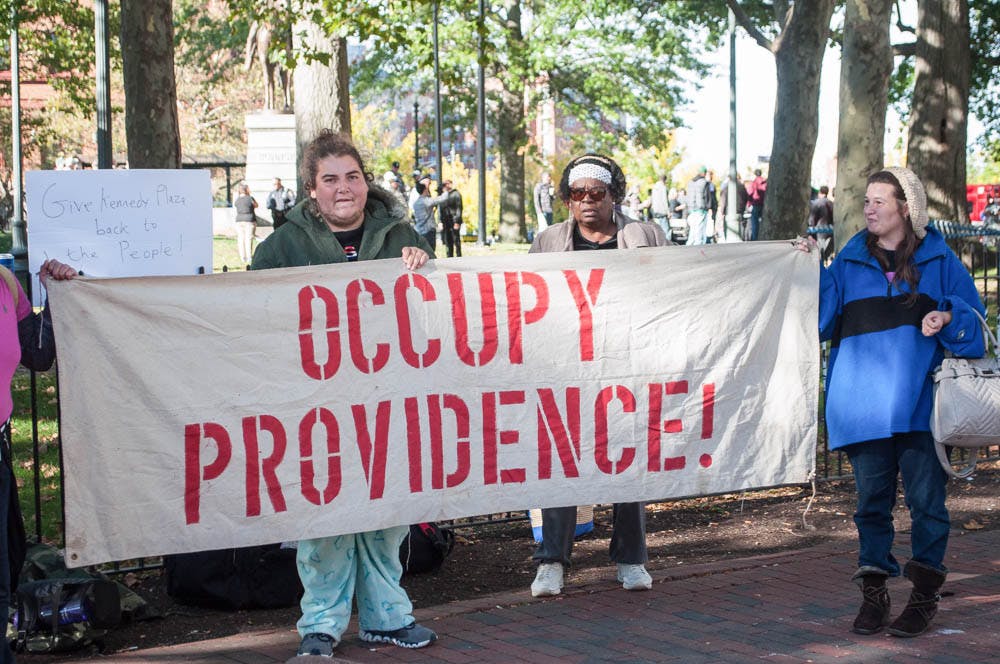October marks the fifth anniversary of the Occupy Providence movement, a protest that saw hundreds of the city’s residents gather in Burnside Park downtown in opposition to economic inequality and corporate greed. To mark the anniversary, a group of advocates for the homeless and other city residents returned to Burnside Saturday to protest proposals for the renovation of Kennedy Plaza and the relocation of the RIPTA bus terminal.
“It’s our fifth birthday, but we’re not happy with the way things are going downtown,” said one protestor, adding, “people are being treated really bad out here.” The same protestor, who identified herself only as Mama Dreads, argued that recent restrictions on smoking and panhandling downtown have soured the relationship between the city’s homeless population and some of its more privileged residents.
Joseph Paolino Jr. P’17, real estate developer and former Providence mayor, wields substantial influence on discussions surrounding the development of Kennedy Plaza as board chairman of the Downtown Improvement District. He has attracted the ire of some homeless advocacy and social service organizations that claim his proposals for Kennedy Plaza are anti-homeless in nature. “We don’t like Joe Paolino very much,” the protestor explained.
“Ever since they started messing with the buses, there’s this feeling that there are people who are wanted downtown and people who are not wanted downtown,” said Pat Fontes, one of the demonstrators celebrating the Occupy Providence anniversary. Fontes added that restrictions on certain activities downtown are rarely enforced for people who are not homeless.
“If you’re white and college-educated and can afford expensive things, then you’re permitted to do things that others aren’t permitted to do,” Fontes said, adding that many who deal with the homeless have the mindset of “we’re willing to permit that you exist, but don’t bother us by putting yourself in our line of vision.”
To voice opposition to the direction of downtown development and the negative perception of homeless people in Providence, advocates carried signs that read “Joe Paolino — biggest panhandler in Providence” and “Give Kennedy Plaza back to the people.” At one point, protestors gathered under an “Occupy Providence” banner and took turns listing demands and concerns for the state of the homeless downtown.
“Let me ask you this question: When did it become a crime for us to ask for help or to unite in a public park?” one protestor questioned. “We are occupy, over 99 percent strong and it doesn’t end here, just know that,” he added. “Occupy Providence for life.”
“Police think homeless people are villains from comic books, but we’re really not,” said Katrina Federicci, a protestor. “We’re trying to better ourselves, but they won’t let us.”
“I fell and got hurt trying to catch a bus from one point to another,” another protester said. “I got severely injured because RIPTA doesn’t have any buses along my route,” she added.
Graduate students from the School of Medicine stood in solidarity with homeless advocates, offering support for the movement and those affected by homelessness. “We’re here to listen because this does relate to your health and well-being, and that’s what we care about,” one student said. “Talk to us, and we’ll do what we can to support you guys.”
A simple religious service conducted by the Church Beyond the Walls ministry preceded the demonstration, offering a Eucharistic mass and homily in addition to a meal for those who needed one. The Church itself grew out of the Occupy Providence movement after makeshift services were held for protestors using Burnside Park as a base of operations.
“It started with a little red toy wagon with some coffee and sandwiches,” said Linda Forsberg ’82, missioner for the church. “Now all these years later, we gather every Saturday for Eucharist and a meal,” she added.
While Forsberg said she hadn’t known that the demonstration would be happening that day, she thought that Paolino’s proposals could have negative consequences for homeless people living downtown.
“I do understand how he as a business owner has his own concerns,” Forsberg said. “But everyone in this city should have the right to be treated fairly and with dignity.”





